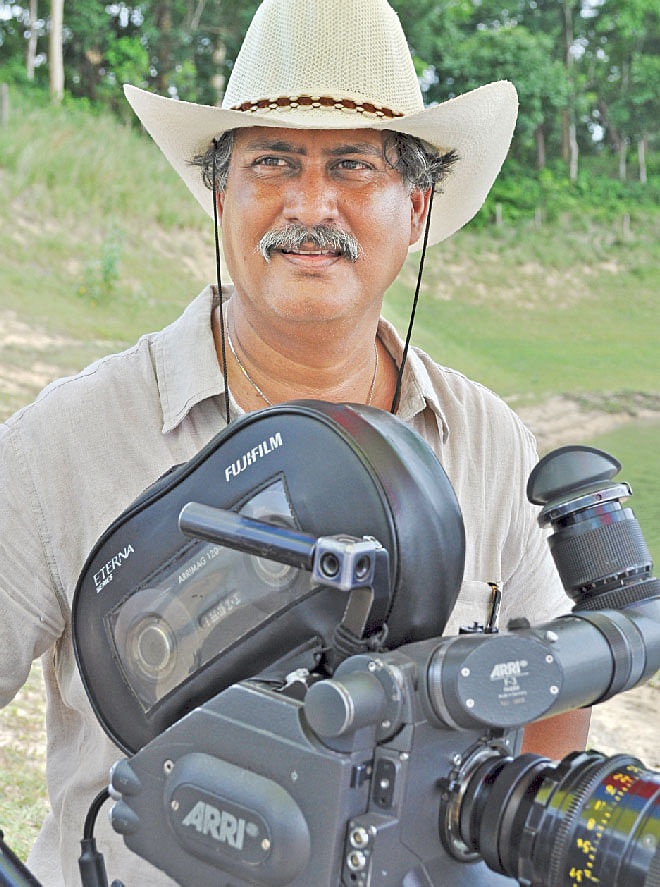10 Things You Didn't Know About Khalid Mahmood Mithu

Khalid Mahmood Mithu is a director, script writer and editor. When he is not immersed in the world of filmmaking, he is also a painter. Recently his movie 'Jonakir Alo (Glow of the Firefly)' has been released in the theatres, and Star Showbiz caught up with him to unveil the secret behind his success.
1. How did you come to the profession of direction?
It's a long story. I found that I was keenly interested in the media and production since I was a child. I grew up around my uncle Alamgir Kabir, the famous director, where I found a favorable condition for learning to direct. My uncle's editing panel was right beside my reading table. Consequently, I got some help with my experimental direction from his equipments. Besides, my mother Begum Momtaz Hossain being a script writer of that time inspired me a lot. When I was in Charukola (Institute of Fine Arts, DU), I achieved a photography award that increased my confidence. Later on, I joined Bangladesh Television in 1986 where I contributed to camera and script work.
2. What is your first production as a director?
I directed 'Shopne Shobuj Pahar' in 1992 which was basically a song program assisted by the SAARC cultural exchange program. In 1993 I directed a play called “Dhusor Album”. Later on, I worked on more than 60-70 plays, an on more than a hundred song programs and few documentaries.

3. What are your favorite movies of all time?
I watch a lot of movies and documentaries personally and with my family. I consider 'Color of Paradise' a very good and aesthetic movie of all time. Besides, 'Pother Panchali', 'Surjo Konna' and 'Le Amor' are a few to be named among my favorite movies.
4. Who have you enjoyed working the most as a director?
It is very easy and comfortable to work with our senior artists because they understand the demand of the time. They can imbibe the characters. I think Humayun Faridi is one of the best and most talented artists Bangladesh has ever produced. He could understand the directors need and express almost the exact same thing expected of him. Afsana Mimi, Shams Sumon and Masum Aziz are some of the names I can remember right now.
5. What is your most embarrassing memory of all time?
Actually, I cannot recall anything right now. However, some haunting memories are ever embarrassing in our media industry. The fundamental services provided from the media industry are very few for the artists. We lack even a well maintained washroom in our FDC (Film Development Corporation). Moreover, the lack of quality artists, cinema hall crisis and lack of support in managing the shooting crew are very embarrassing. We have to take all the liability of managing shooting units as a director or producer in and outside the FDC and the government or media industry does not provide any help.
6. What are some of the common challenges you face as a director in Bangladesh?
The absence of a television and media studies institute is very striking today. We are lagging behind in the competitive market due to it. The artists working here are self-educated. It is their creative impulse which is enabling them to carry on their acting, direction or anything related to production. Moreover, the dirty politics in this industry is very disappointing. Additionally, the distribution system, corruption and nepotism hinder our production. Our government is providing aid for the industry but the policy makers are unable to create the right supportive policy environment, I think.
7. In your opinion, what are the most important things missing from our overall media today?
I think the important fact is that we have no genuine script. Due to the lack of unique scripts and stories of our own identity and culture, we are copying things from foreign cultures that results in loss of our creativity and cultural uniqueness. Besides, we have lack of creative artists and producers. As a result, many directors cannot work on his planned themes which seems convincing to them.
8. You worked on television production first and then on movies. Do you think television direction is a starting point to get to movies?
Actually, television production helps in learning camera work, not direction. Direction is an inborn quality which one has to find from within. Since we don't have any institute to learn direction and camera work in Bangladesh, anyone can start with television production. I think it will help him mature his aesthetic imagination. However, I think anyone has to set his goal first weather he wants to work on movies or television productions. It would be better for our industry to have learned directors in movies rather than mere inexperienced directors.
9. What would be your word of advice for those who want to enter the world of making television dramas?
Anyone interested in making television dramas in Bangladesh should concentrate on the technical aspect, especially the projection system of a production. Besides, the television production related study can help understand the production very well. Prior knowledge on composition would help them largely. Furthermore, maintaining uniqueness in script can increase the television flavor of our viewers.
10. Tell us something about your painting exhibition.
I am glad that Athena Gallery of Fine Arts has hosted my solo art exhibition that focuses on my diversified experience for the last one and half year. I have captured our political turmoil, labor uprising, garments exploitation and so on. Besides, a large part of this exhibition is on the theme of my recent movie 'Jonakir Alo'. I welcome the viewers to the exhibition, it will continue till May 15, 2014.

 For all latest news, follow The Daily Star's Google News channel.
For all latest news, follow The Daily Star's Google News channel. 



Comments